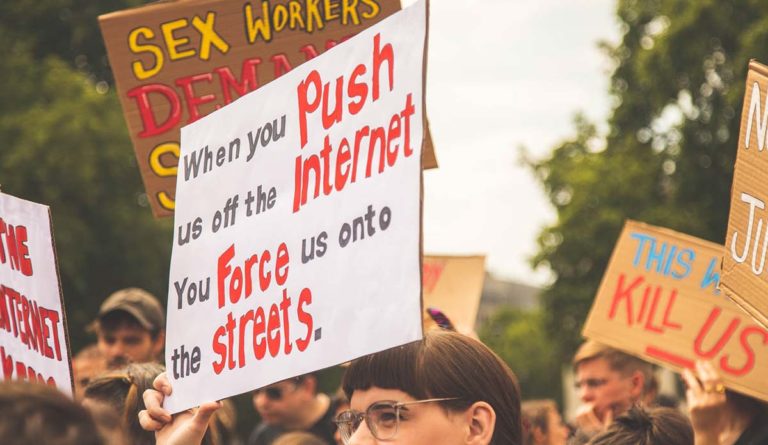It's Dangerous to Confuse Sex Work and Trafficking
A new law designed to thwart online sex trafficking shuts down sites like Backpage.com and Craigslist personal ads. Sex workers use these sites to solicit and vet clients and share information about predators and say the legislation increases the dangers they face.

Read Time: 4 minutes
Published:
What were you doing on International Whore’s Day (June 2)? If you are a sex worker or a sex worker advocate, you may have been protesting the new anti-sex trafficking legislation President Trump signed in April. The new law (HR 1865) led to an immediate shut-down of the websites sex workers use to solicit and vet clients, negotiate payment, and share information about predators. Backpage.com was seized by the federal government. Craigslist killed their personal ads. EventBrite stopped promoting events with explicit sexual content. Many others followed.
The new law is an amalgam of two bills: House Bill 1865 (also known as the Allow States and Victims to Fight Online Sex Trafficking Act of 2017 or FOSTA) and Senate Bill 1693 (the Stop Enabling Sex Traffickers Act or SESTA). The long names, numbers and acronyms get confusing quickly. The new law is the House version, FOSTA, but many activists and the media refer to it as SESTA or SESTA/FOSTA. This naming ambiguity is just the first layer of semantic obfuscation.
Most of the language of the new legislation focuses exclusively on sexual trafficking of others. The goal is to eliminate traffickers’ online ability to lure vulnerable children and adults into a web of false promises and then sell them to perpetrators of rape and abuse. HR 1865 amends the Communication Act of 1934 to specify that websites are not protected from legal action when they “unlawfully promote and facilitate prostitution” and “facilitate traffickers in advertising the sale of unlawful sex acts with sex trafficking victims.” It also criminalizes operation of interactive internet services to “promote or facilitate the prostitution of another person.”
The problem is that the law conflates voluntary sex work with coerced prostitution (i.e., trafficking). As a result, it targets all online sex forums as trafficking venues that serve no positive purpose.
Prior to the internet, sex workers met clients on the streets and in bars, and often worked under the control of pimps or other third parties who controlled them and took their money. Online platforms allowed many to work autonomously, make decisions from a safe distance about which clients to meet, and collect their negotiated fees electronically without the risk of being robbed or cheated.
Prior to the internet, sex workers met clients on the streets and in bars, and often worked under the control of pimps or other third parties who controlled them and took their money. Online platforms allowed many to work autonomously, make decisions from a safe distance about which clients to meet, and collect their negotiated fees electronically without the risk of being robbed or cheated.
Sex workers marched in June to protest SESTA/FOSTA as one more federal law ostensibly created to protect individuals from exploitation and violence that is, instead, doing harm. The Department of Justice defines human trafficking as “modern-day slavery,” involving victims who are “exploited for commercial sex in numerous contexts, including street prostitution, illicit massage parlors, cantinas, brothels, escort services, and online advertising.” Sex workers argue that their chosen profession is the antithesis of trafficking.
Sex workers and anti-trafficking advocates are often at odds as many of the latter see all selling of sex as a form of exploitation that must be abolished. But the SESTA/FOSTA protests have taken a twist. While some anti-trafficking activists heralded the internet crackdown, others (including trafficking survivors) have allied with sex workers to decry the new law, claiming that internet advertisements are critical for tracking and rescuing trafficking victims and providing evidence to prosecute perpetrators.
Exchanging sex for money is illegal in the United States, with the exception of some counties in Nevada. For this reason, sex workers have been forced to operate in the shadows of the internet and other unregulated spaces alongside perpetrators of human bondage and sexual assault. The 2018 International Whores’ Day protests made it clear that HR 1865 pushes sex workers and trafficking victims into even darker corners without the protection provided by the internet.
Feature image: juno mac, SW_PARLIAMENT_PROTEST_080318_046, (detail). Sex workers demonstrate outside a parliamentary debate in London on the 4th July 2018, to protest discussion of a UK version of FOSTA (A US law that criminalizes the advertising of sex work on the internet) and to draw attention to their campaign to fully decriminalize sex work, used under CC BY-NC-ND 2.0



